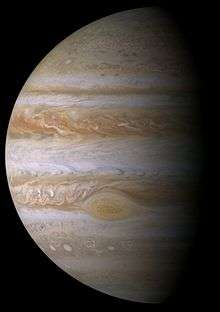Jupiter Europa Orbiter
Not to be confused with Jovian Europa Orbiter.
|
Montage with JEO | |
| Operator | NASA |
|---|---|
| Website | ESA Webpage on Laplace/EJSM |
| Mission duration | cruise period 5-6 years, science period 3 years (proposed) |
| Spacecraft properties | |
| Launch mass | 1,371 kg (3,023 lb) |
| Start of mission | |
| Launch date | 2020 (proposed) |
| Rocket | Delta IV-H, Ares V or Atlas V |
| Orbital parameters | |
| Reference system | Europa orbit |
| Semi-major axis | 100 km (62 mi) |
| Inclination | 95°–100° |
| Europa orbiter | |
| Orbital insertion | 2025–2026 (proposed) |
As a part of the defunct Europa Jupiter System Mission – Laplace (EJSM/Laplace), the Jupiter Europa Orbiter (JEO) was a proposed orbiter probe slated for lift-off in 2020 and planned for detailed studies of Jupiter's moons Europa and Io as well as the Jovian magnetosphere.[1] Its main goal would have been to look for evidence of a possible subsurface ocean.[2]
In June 2015, a more economical mission, the Europa Multiple-Flyby Mission (Europa Clipper) was approved by NASA and entered the formulation stage.[3]
References
- ↑ Battersby, Stephen (November 5, 2009). "A drop in the bucket is plenty". The National. Retrieved 2009-11-08.
- ↑ Jupiter Europa Orbiter (JEO) Concept
- ↑ Howell, Elizabeth (20 June 2015). "NASA's Europa Mission Approved for Next Development Stage" Space.com. Retrieved 2015-06-21.
This article is issued from Wikipedia - version of the 11/5/2016. The text is available under the Creative Commons Attribution/Share Alike but additional terms may apply for the media files.


